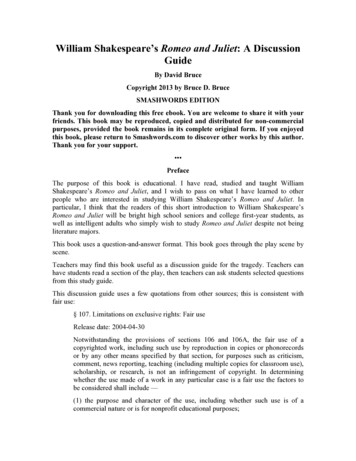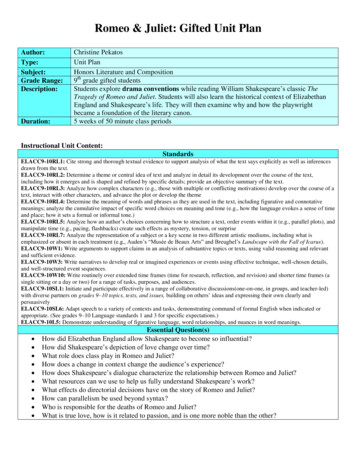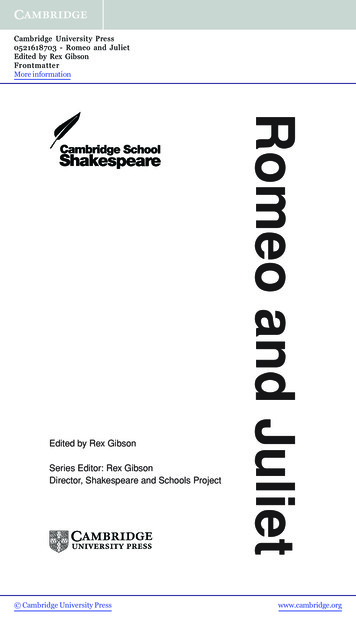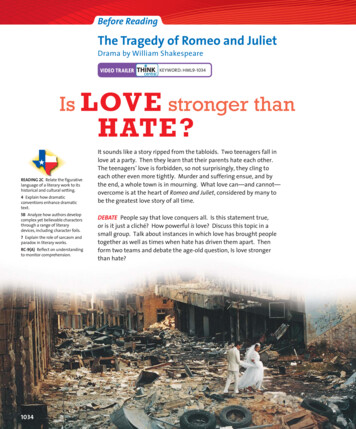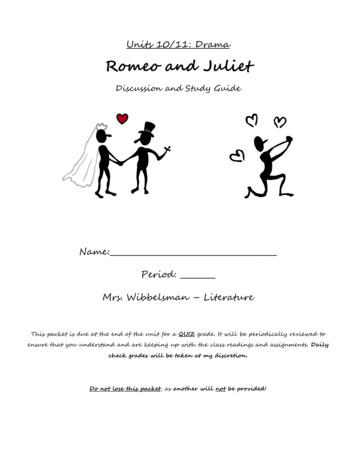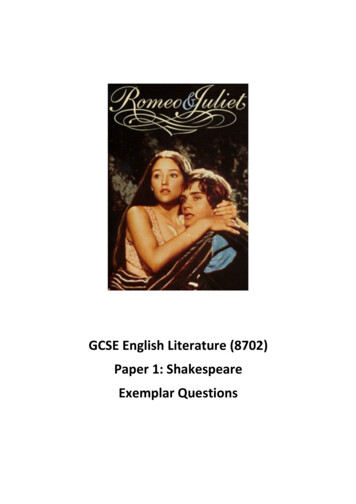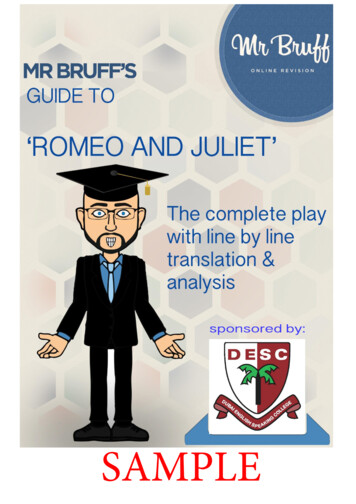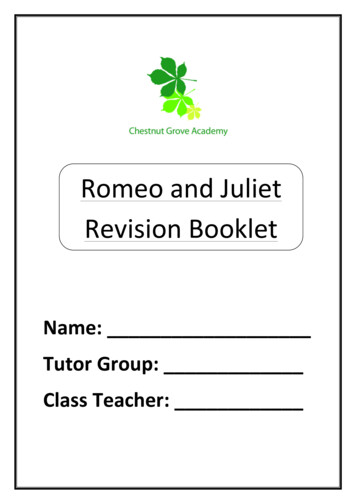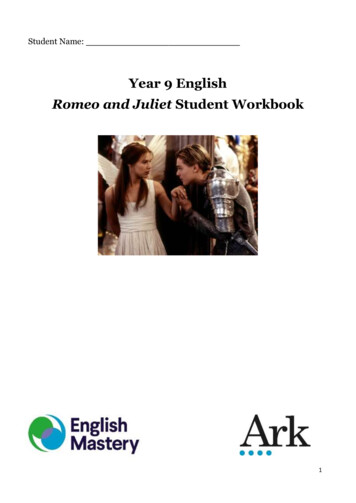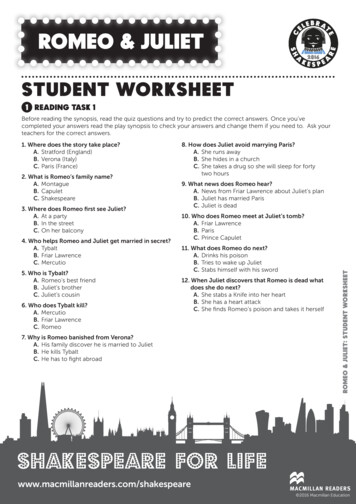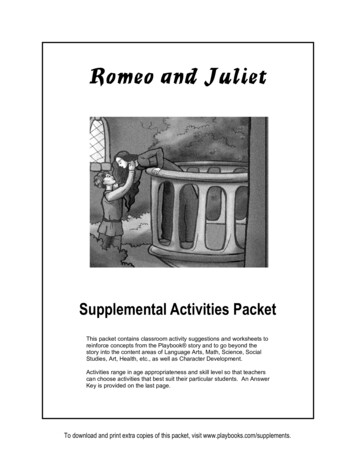
Transcription
Romeo and JulietSupplemental Activities PacketThis packet contains classroom activity suggestions and worksheets toreinforce concepts from the Playbook story and to go beyond thestory into the content areas of Language Arts, Math, Science, SocialStudies, Art, Health, etc., as well as Character Development.Activities range in age appropriateness and skill level so that teacherscan choose activities that best suit their particular students. An AnswerKey is provided on the last page.To download and print extra copies of this packet, visit www.playbooks.com/supplements.
NameThee or Thou? Poetry or Prose?Know the Difference!PART A: Shakespeare wrote with many words which are no longer in common use today. In some cases, Shakespeare usedboth outdated and modern day words with the same meanings. For example, he often used the words, “thee,” “thou,” “thy,”and “thine,” but also throughout the same plays used the words “you,” “your” and “yours.” So what is the proper usage ofthese words? See the chart below.WordUsageExampletheeObjective form of “you”Note: Use “ye” to refer to more than one personBy a name I know not how to tell thee who I am.thouSubjective form of youNote: Use “ye” to refer to more than one personArt thou not Romeo and a Montague?thyIndicates possession, when referring to a noun that follows (or precedes in some cases), and when the noun does notbegin with a vowel soundAnd I will take thy word.Indicates possession, when no noun follows, or whenthe following noun does begins with a vowel soundThus from my lips, by thine,my sin is purged.thineSpecial Note: When using “thou” instead of “you,” certain verb forms must be different. Proper verb forms to follow “thou”include “art,” “hast,” “doest” “wast” and “hadst.” Include this information when completing the following activity.To download and print extra copies of this page, visit www.playbooks.com/supplements.Directions: The sentences or passages below are from Romeo and Juliet and showinstances where Shakespeare used “you,” “your,” and “yours.” Cross out theinstances of “you,” “your” and “yours” and write above or below the correct word toreplace it from the chart above. Remember to also cross out and replace anyincorrect verb forms following “thou.”1.Good morrow to you both. What counterfeit did I give you?2.A plague on both your houses! Why the devilCame you between us? I was hurt under your arm!3.Well, what was yours?4.You must contrary me?Go, be quiet, or for shame, I’ll make you quiet!5.Good pilgrim, you do wrong your hand too much.Next, on a separate sheet of paper, write a letter to your bestfriend using the words “thee,” “thou,” “thy,” and “thine,”wherever appropriate.PART B: While reading Romeo and Juliet, you probably noticed a difference between the way Romano and Julia speak andthe way Shakespeare’s character’s usually speak, but did you notice that Shakespeare’s characters’ lines are not always in thispoetic form? The contrast is not as evident in this particular play as in some other works of Shakespeare’s because only 7%of the play is not in verse. However, like many of his plays, Romeo and Juliet shows a variance in form in that some (most)of the lines are written in iambic pentameter (verse) and some are in everyday normal speech (prose).Prose is usually indicated when you see a paragraph or sentence that carries over to the next line like the sentences in theparagraph above, without starting a new capitalized line. While sometimes a poetic form other than iambic pentameter maybe used, if a line does not fit the rules of iambic pentameter it may be a clue that it is prose. For example, if the line does nothave 10 syllables, or if it does not alternate in syllable sounds of non-stressed followed by stressed, it does not fit the strictrequirements of iambic pentameter and may be identified as prose.When Shakespeare uses prose, it can indicate several different things. Often, servant or working class characters speak inprose to show their ranking below the more important characters. Sometimes, prose is used for practicality to show morerealistic speaking patterns, especially for very short phrases. In addition, prose can sometimes portray a character’s unstablemental or emotional condition, or by contrast, a comedic or joking tone.Directions: Find four examples of lines from different parts of the play that show Shakespeare’s characters speaking inprose, and for each case, explain why you think Shakespeare chose to use prose instead of verse. Write down the act, scene,and page number of each of your examples and your answers on a separate sheet of paper.Language ArtsVocabulary/ Poetry/Forms of Writing
NameRomano and JuliaDirections: In this version of Romeo and Juliet, we meet two modern daycharacters who are transported to the world of Romeo and Juliet and seethe play taking place before their eyes. Answer each essay question aboutthe role of our guest characters on the lines provided.To download and print extra copies of this page, visit www.playbooks.com/supplements.1. Explain the various purposes of the characters of Romano and Julia in this script. What do they bring to thestory?2. Compare and contrast the relationships and situations between Romano and Julia and Romeo and Juliet.3. Describe how either Romano or Julia changes or grows through the course of the play.4. What did you think of the play’s twist ending (the fact that the events they were watching were not real afterall but a magical performance with actors)? How, if at all, does this turn of events affect your interpretation ofthe play in its entirety with its modern day framing?Language ArtsWriting/ Critical Thinking
NameYou Can’t Read ShakespeareWithout Puns!Whether you’re looking at Shakespeare’s comedies or tragedies, you will always find punsused for humor or to highlight a point. A pun is a play on words based on the similarity ofsound between two different words with different meanings. The example that Julia points outto Romano in Romeo and Juliet is this:Mercutio: Ask for me tomorrow, and you shall find me a grave man.Explanation: Mercutio has been wounded and is about to die, so what he means is that he will be dead and buriedin a grave, but the sentence sounds as if he is saying he will be sad.Directions: Look for seven more puns in Romeo and Juliet and complete the chart below with your findings.To download and print extra copies of this page, visit www.playbooks.com/supplements.Pun(quote, act, scene, and page number)Why is it funny? What doesthe pun mean?Does a certain character or characters seem to use the most puns in their lines in the play? What does this showabout their role in the play?Language ArtsLiterary Devices
NameFrom Quill to Stage .and Potion to PoisonPART A: Clearly, the process of writing a play in Shakespeare’s timewas a lot different than it is now. Instead of being able to type or evenwrite with a convenient ink-stocked pen, he wrote the drafts of hisplays with a quill (made from a feather) dipped in ink. Some types of quills were better than others,and what was used would have been based on what was affordable at the time. Goose quills werecheapest and swan quills were more luxurious, for example.Shakespeare most likely attempted to do most of his writing during the day, because writing at nightwould require lighting candles or a gas lamp, which were quite costly. However, because his work asan actor required him to work during the day, he probably was forced to do substantial writing atnight as well.One interesting note about the writing process in Shakespeare’s time is that there was no standardizeddictionary, so writers could use alternate spellings, foreign words, and even make up their own wordsas they pleased, which Shakespeare did plenty! For example, in his plays, he invented the words,“eyeball,” “cold-blooded,” “critic,” and “gossip.”Next: Censorship and PurchaseTo download and print extra copies of this page, visit www.playbooks.com/supplements.Directions: Using the Internet at home or at your school’s library, research what the process forediting, censorship, and selling of a play manuscript was like in Shakespeare’s time. Write an essaydescribing what you learn.PART B: In the play, Romeo buys poison from an apothecary, the equivalent of a pharmacist inShakespeare’s time. Apothecaries were first considered a type of grocer and prepared and sold herbs,medicines, and other concoctions, some of which were of a poisonous variety. Poisons play a largerole in many of Shakespeare’s plays, including Romeo and Juliet, with both Juliet’s sleeping potionand Romeo’s choice of suicide method.Eventually, apothecaries were separated from grocers and created a new specific class of workers.Apothecaries were one option for the sick to seek treatment by purchasing reported cures. There werealso doctors whose job was to diagnose and treat patients in Shakespeare’s time, but illnesses werelargely misunderstood. Shakespeare’s son-in-law, John Hall, was a physician, and Shakespeare’sresulting fascination with medicinal issues can be seen in his work. Interestingly, Dr. John Hallactually stands out as a relatively effective care provider for his time, with patients responding totreatments offered for scurvy, for example.Directions: Choose one of the following topics below to research using the Internet at home or atyour school’s library.Option 1: Research and write a short essay on Dr. John Hall, Shakespeare’s son-in-law. Explain thecommon medical practices of the time and how/why Dr. Hall found some unique success in treatingdisease.Option 2: Research some of the types of poisons that were common in Shakespeare’s time or thatShakespeare would have been referring to in his plays. Explain their origins, properties, and anyinteresting facts.History/ ScienceResearch Project
Discussion QuestionsDirections: Take notes on your answers to the followingquestions about Romeo and Juliet (completing whicheverquestions your teacher instructs). Your teacher will thenlead a discussion of the questions with the entire class.1. At the beginning of the play, the chorus says it is the tale of two “star-crossed lovers.”Explain what this means and how the circumstances and events of the play match upwith this theme.2. What are some examples of foreshadowing in the play formed by the characters’language? Explain.3. How do many of the characters in the play act selfishly? Give various examples anddiscuss how their failure to think of the effects on other people led to disaster.4. How is the theme of hastiness apparent in the play? What is the lesson taught?5. Compare Juliet’s relationship with her nurse to her relationship with her parents. Whatdo you think contributed to this family dynamic?To download and print extra copies of this page, visit www.playbooks.com/supplements.6. Why does the Friar agree to marry Romeo and Juliet? What factors known ahead of timewould cause you to question the wisdom of his decision?7. What is Mercutio’s role in the play? How do his speeches and statements compare withRomeo’s?8. Why does the Apothecary sell Romeo the poison, knowing nothing good would come ofit? What is Shakespeare saying about humanity with the Apothecary’s decision?9. How is love portrayed in the play and what are its results? Is it a benevolent force?10. How is the motif of poison explored in the play? Examine the Friar’s lines on pages 2526 and explain what he means.11. What is the meaning behind Mercutio’s speech about Queen Mab (pages 13-14)?12. Compare and contrast Romeo’s love for Juliet with his former love for Rosaline. Do youthink his feelings are fundamentally different with Juliet or do certain additional factors(if so, what?) cause the much stronger bond to be formed?13. How does Juliet mature (or not) over the course of the play? Examine Juliet’s responseto her parents in regard to considering Paris as a husband (page 12). What is yourimpression of her attitude?14. What is the overall attitude towards the feud between the Capulets and Montagues in theplay? Support your answer with evidence from the text.15. What is the role of the Nurse in the action of the play? How does the Nurse’s advice toJuliet vary?Language ArtsCritical Thinking / Discussion
Answer KeyRomeo and JulietThee or Thou? Poetry or Prose?PART A:1.Good morrow to ye both. What counterfeit did I give ye?2.A plague on both thy houses! Why the devilCamest thou between us? I was hurt under thine arm!3.Well, what was thine?4.Thou must contrary me?5.Good pilgrim, thou dost wrong thy hand too much.Go, be quiet, or for shame, I’ll make thee quiet!PART B: (Sample Answers)1.GREGORY: “The quarrel is between our masters and us, their men.” (Act 1, Scene 1, page 3) Shakespeare has written this line in prose because thespeaker is a servant.2.BENVOLIO: “Why, Romeo, art thou mad?” (Act 1, Scene 2, page 9) This line is in prose because Benvolio’s short statement directly to Romeo wouldsound unnatural and excessive in verse.3.NURSE: “A man, young lady! Lady, such a man as all the world.” (Act 1, Scene 3, page 11) The nurse is a working class character, her line forms anexclamation to Juliet that would not translate into verse, and also, perhaps her excitement about the topic could be a reason for her to speak in prose.4.LADY CAPULET: “Tybalt! O my brother’s child!” (Act 3, Scene 1, page 36) Lady Capulet is grief-stricken by Tybalt’s death and this could be areason for speaking in prose. The line is also short and provides a realistic reaction to the situation that verse would not.Romano and Julia (Sample Answers)To download and print extra copies of this page, visit www.playbooks.com/supplements.1. Romano and Julia help make the story more relatable. They offer a current day contrast to the traditions of Shakespeare’s time and yet mirror a tale of twopeople who like each other but are different. Julia loves Shakespeare and Romano doesn’t; Julia isn’t sure if her parents would let her date Romano. Inaddition, the characters help make the play more understandable by discussing key passages and language used in Shakespeare’s text.2. Romeo and Juliet and Romano and Julia are all teenagers. While Romano and Julia are in high school, Romeo and Juliet are quickly approaching adulthoodand even think about and follow through on getting married. Romano and Julia, in today’s modern times, are much too young to think about more thanpossibly dating. Romeo and Juliet can’t be together because their families are enemies, and hints are made that Romano and Julia isn’t sure if her parentswould like her dating Romano. Of course, Romano and Julia are sensible, while Romeo and Juliet make some very rash decisions that end in tragedy.3. Romano learns to appreciate Shakespeare because it is so much easier to enjoy when he actually understands what is happening and being said. This willhelp him find new confidence in school. In addition, at first he seems to think the situation and possibly Julia are a bit strange, but by the end, theirfriendship has started.4. I liked the ending because it is a little more realistic (though still requires suspension of disbelief) than the play actually happening in real events. It alsomeans that Romano and Julia were not actually watching the gruesome ends of the characters who died, but instead just getting the treat of a fantasticperformance.You Can’t Read Shakespeare Without Puns!PunWhy is it funny? What does the pun mean?MERCUTIO: “That dreamers often lie!” (Act 1, Scene 4, page 13)Those who dream usually are asleep lying in bed, but Mercutio also means thatdreams can be untrue and give false hopes.ROMEO “You have dancing shoes with nimble soles. I have a soul oflead.” (Act 1, Scene 4, page 12)Romeo refers to the physical properties of shoes, but also to emotional states.He is too sad and love sick to dance.ROMEO: “He jests at scars that never felt a wound.” (Act 2, Scene 2, page 19) Romeo’s literal statement really means that Mercutio can’t understand Romeo’sfeelings because he has never been in love before.MERCUTIO: “Poor Romeo, he is already dead, stabbed with a white wench’sblack eye, shot through the ear with a love-song.” (Act 2, Scene 4, page 28)Mercutio is referring to the danger of death faced in a duel with Tybalt, butpointing out Romeo’s helpless condition of being in love.MERCUTIO: “You gave us the counterfeit fairly last night.” (Act 2, Scene 4,page 28)Mercutio goes on to explain he means “the slip” because a counterfeit coin wascalled a slip. Mercutio means that Romeo snuck off to see Juliet without them.MERCUTIO: “Consort! What, dost thou make us minstrels?” (Act 3, Scene 1,page 34)Mercutio is asking is Tybalt is calling them musicians, because “consort”sounds like “concert” and a minstrel is a type of band.ROMEO: “Is it even so? Then I defy you, stars! Well, Juliet, I will lie with thee Romeo thinks that Juliet is dead, and so instead of being with her in theirtonight.” (Act 5, Scene 1, page 57)marriage bed, he will lie next to her in death after killing himself.Question: Mercutio uses puns very often in his lines, showing him to be a character offering jokes at Romeo’s expense regarding his lovesickness, and comic reliefin serious circumstances.
Playbooks Reader’s Theater27702 Crown Valley D-4 #165Ladera Ranch, CA 926941-866-616-7562www.playbooks.com 2010 Playbooks Reader’s Theater, Ladera Ranch, CAThe Playbook format is protected under U.S. Patent Nos. 6,683,611,6,859,206, and 7,456,834 with additional patents pending.
Directions: In this version of Romeo and Juliet, we meet two modern day characters who are transported to the world of Romeo and Juliet and see the play taking place before their eyes. Answer each essay question about t
